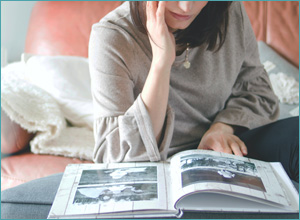Speak up!
If you've written a blog, wish to share a story, or have an idea that you believe would help those visiting the End With Care website, please send it along. If fitting, we'll add your voice to End With Care.
I've got an ideaManaging Your Loved One’s Personal Belongings
Posted on November 6, 2022
 The death of a loved one can be a heartbreakingly emotional and stressful experience. Along with grieving their loss, you may also have to deal with funeral arrangements, take care of legal issues, or make financial decisions. Adding to this list, you may also be faced with the task of how to handle your loved one’s belongings.
The death of a loved one can be a heartbreakingly emotional and stressful experience. Along with grieving their loss, you may also have to deal with funeral arrangements, take care of legal issues, or make financial decisions. Adding to this list, you may also be faced with the task of how to handle your loved one’s belongings.
Aside from possibly being a physically daunting assignment, simply sorting through a loved one’s possessions can spark a host of feelings. Some pieces from their life may bring back happy and loving memories, others may trigger grief as a sad reminder of their passing. It's important to prepare yourself for this potential emotional rollercoaster. Although it may be challenging, make sure to tackle this task with a plan and a process which also includes taking care of yourself. The following ideas and tips can make this undertaking a little easier and may help with the healing process after the loss of a loved one.
Make a Plan
The mere thought of having to deal with a deceased love one’s belongings can feel overwhelming. They may have left behind a household filled with furniture, clothing, jewelry, art, family treasures and heirlooms, and souvenirs collected over a lifetime. Having a plan to manage this task, along with support from family and friends will make it easier to know where to start and what to do.
First, before you begin to think about how to deal with their possessions, determine whether your loved one had a will or left instructions behind regarding how any specific items are to be distributed, split, or earmarked for someone after they are gone. This may be the first step in the process, and as an additional benefit can help resolve potentially painful disagreements or disputes.
Next, recognize that you can’t save it all. Regardless of the strong emotional attachments you may have to some of your loved one’s things, on a practical basis, accept that you likely can’t keep all their belongings.
Finally, before you begin this task, decide whether you’d like to do it alone or if you’d prefer help. You might look to a sibling, other close family member, or friend for support. In addition to having assistance handling the shear physical demands, you may value their thoughts and opinions to help you make any difficult decisions.
Develop a Process
 Depending on your situation, you may be looking at hundreds and hundreds of objects acquired throughout their life. With a seemingly difficult job in front of you, it’s often hard just to know where to begin. Go room-by-room? Do furniture first? Clothing? Having a gameplan will help you stay organized, so decide what works best for you. One method to consider may be to start with the trash or target what may have little sentimental value first. These items will probably be the easiest to get rid of and making these quick decisions can create momentum and help you get this difficult task rolling.
Depending on your situation, you may be looking at hundreds and hundreds of objects acquired throughout their life. With a seemingly difficult job in front of you, it’s often hard just to know where to begin. Go room-by-room? Do furniture first? Clothing? Having a gameplan will help you stay organized, so decide what works best for you. One method to consider may be to start with the trash or target what may have little sentimental value first. These items will probably be the easiest to get rid of and making these quick decisions can create momentum and help you get this difficult task rolling.
Regardless of your approach, as you sort through everything, think in terms of making piles and assigning items to categories.
- Keep for me and my family. Although it’s natural to want to save any real reminder of your loved one, be realistic. Do you have the room for that dining room set? Do you really need to keep their entire collection of glass bowls? For those items that may seem difficult to part with, consider taking a photograph instead. It may not be practical to keep something, and the picture can be a way for you to hold onto your memories. As you make some hard decisions, determine what and how much you are able to keep. Set limits and select those things that have meaning for you and that will fit with your lifestyle.
- Keep for someone else. Unless already noted in a will or by other known wishes, ask family members or friends who had a close relationship with the deceased if there might be something they would like to have as a remembrance. Something that might have little meaning to you, might have great sentimental significance to someone else.
- Sell. There are a host of online platforms, like eBay, Facebook Marketplace, Craigslist, etc. that you can use, or consider holding a yard sale or garage sale?
- Donate. With the variety of worthy organizations in need of clothing, food, household goods, and furniture, think about donating to charity. This can also provide a greater sense of meaning for you as you sort through your loved one’s possessions and can make some decisions less painful, for example, donating a spouse’s clothing. Other organizations to consider:
- Salvation Army
- Goodwill
- Homeless Shelters
- Women’s Shelters
- Charities for Veterans
- Non-profit organization or charity near and dear to your deceased loved one
- Discard or throw away.
- Store. If undecided, you could put into storage until you make a final decision.
Don't Forget About Yourself
 The loss of a loved one is never an easy experience but keeping things that were a part of their life can help you feel that they remain a part of your life. As you go through their belongings piece by piece, deciding how much or how little to keep is often fueled by emotions, from joy and love to pain and grief. It can be difficult to know what might matter most to you, so:
The loss of a loved one is never an easy experience but keeping things that were a part of their life can help you feel that they remain a part of your life. As you go through their belongings piece by piece, deciding how much or how little to keep is often fueled by emotions, from joy and love to pain and grief. It can be difficult to know what might matter most to you, so:
- If possible, take the time you need to acknowledge your grief before you begin. This may help you avoid deciding to keep some things or get rid of things that you later wish you had held onto.
- If you are feeling overwhelmed, take a breather until you’re in a better state of mind. Being overcome can make it more difficult to make decisions.
- Understand that it’s all right to hold onto those things that make you feel connected and understand that it’s also all right to let things go. Sometime letting go can feel as if a weight has been lifted and can help us move on.


